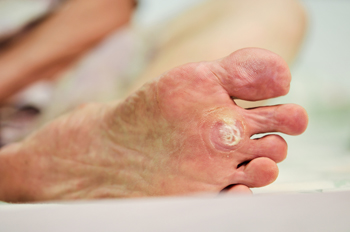Facts About Plantar Warts
Tuesday, 25 April 2023 00:00
Plantar warts, also called verruca, are hardened growths that usually develop on the sole of the foot. They appear as rough, grainy, rounded lesions that may be covered by calluses and have tiny black dots. Plantar warts typically cause pain on the ball or heel of the foot, where they are most likely to form. This can affect both the way you stand and your gait, or the way you walk, which in turn can contribute to pain in other body parts. Because plantar warts are contagious, they can easily spread into clusters called mosaic warts. Plantar warts are caused by the human papillomavirus, or HPV, which usually enters through cracked dry skin or small cuts or sores on the feet. Children, teenagers, and people with weakened immune systems are particularly at risk of plantar wart infection. A plantar wart can take up to two years to go away on its own, and for that reason it is suggested that you see a podiatrist who can offer advanced treatment methods, including freezing off the warts and prescription medication.
Plantar warts can be very uncomfortable. If you need your feet checked, contact Dr. Mark Spier from Maryland. Our doctor will assist you with all of your foot and ankle needs.
About Plantar Warts
Plantar warts are the result of HPV, or human papillomavirus, getting into open wounds on the feet. They are mostly found on the heels or balls of the feet.
While plantar warts are generally harmless, those experiencing excessive pain or those suffering from diabetes or a compromised immune system require immediate medical care. Plantar warts are easily diagnosed, usually through scraping off a bit of rough skin or by getting a biopsy.
Symptoms
- Lesions on the bottom of your feet, usually rough and grainy
- Hard or thick callused spots
- Wart seeds, which are small clotted blood vessels that look like little black spots
- Pain, discomfort, or tenderness of your feet when walking or standing
Treatment
- Freezing
- Electric tool removal
- Laser Treatment
- Topical Creams (prescription only)
- Over-the-counter medications
To help prevent developing plantar warts, avoid walking barefoot over abrasive surfaces that can cause cuts or wounds for HPV to get into. Avoiding direct contact with other warts, as well as not picking or rubbing existing warts, can help prevent the further spread of plantar warts. However, if you think you have developed plantar warts, speak to your podiatrist. He or she can diagnose the warts on your feet and recommend the appropriate treatment options.
If you have any questions please feel free to contact one of our offices located in Columbia and Reisterstown, MD . We offer the newest diagnostic and treatment technologies for all your foot and ankle needs.









